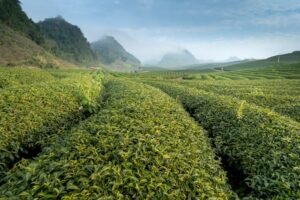Environmental conservation is a pressing issue in today’s world. With the increasing threats of climate change, pollution, and deforestation, it has become crucial for individuals and communities to take action to protect the environment. One way to contribute to this cause is by learning and understanding Chinese environmental vocabulary.
Chinese environmental vocabulary refers to the words and phrases used to discuss and communicate about environmental issues in the Chinese language. As China is one of the world’s largest economies and has a significant impact on global environmental issues, being able to understand and discuss these topics in Chinese can be highly beneficial.
Table of Contents
ToggleUnderstanding the Importance of Eco-Consciousness
Eco-consciousness refers to the awareness and understanding of the impact that human activities have on the environment. It involves recognizing the interconnectedness of all living beings and ecosystems, and taking responsibility for our actions to minimize harm to the environment.
In today’s world, eco-consciousness is more important than ever. Human activities such as deforestation, industrial pollution, and greenhouse gas emissions have led to significant environmental degradation and climate change. By developing eco-consciousness, individuals can make informed choices that reduce their ecological footprint and contribute to a more sustainable future.
The Significance of Learning Chinese Environmental Vocabulary
Learning Chinese environmental vocabulary is important for several reasons. Firstly, it allows individuals to engage with Chinese-speaking communities on environmental issues. China is the world’s most populous country, and its rapid economic growth has led to significant environmental challenges. By being able to communicate about these issues in Chinese, individuals can engage with Chinese-speaking communities, raise awareness, and promote action.
Secondly, learning Chinese environmental vocabulary enables individuals to access information and resources in Chinese about environmental conservation. China has a rich history of environmental philosophy and practices, and there are many valuable resources available in Chinese that can deepen one’s understanding of environmental issues.
Lastly, learning Chinese environmental vocabulary demonstrates a commitment to global environmental conservation. By investing time and effort into learning a language, individuals show their dedication to understanding and addressing environmental challenges on a global scale.
The Role of Language in Environmental Conservation
Language plays a crucial role in environmental conservation. It is through language that we communicate our ideas, values, and concerns about the environment. Language can be used to raise awareness, educate others, and inspire action.
By learning Chinese environmental vocabulary, individuals can effectively communicate their ideas and concerns about the environment to Chinese-speaking communities. This can help bridge cultural and linguistic barriers, fostering understanding and collaboration in the pursuit of environmental conservation.
Furthermore, language can be used to shape public discourse and policy around environmental issues. By using precise and impactful language, individuals can influence public opinion and advocate for change. Language has the power to inspire action and mobilize communities towards sustainable practices.
Key Chinese Environmental Vocabulary Words
1. 环境保护 (huánjìng bǎohù) – Environmental Protection
2. 气候变化 (qìhòu biànhuà) – Climate Change
3. 可持续发展 (kěchíxù fāzhǎn) – Sustainable Development
4. 节能减排 (jié néng jiǎn pái) – Energy Conservation and Emission Reduction
5. 生态系统 (shēngtài xìtǒng) – Ecosystem
6. 污染 (wūrǎn) – Pollution
7. 野生动物保护 (yěshēng dòngwù bǎohù) – Wildlife Conservation
8. 可再生能源 (kě zàishēng néngyuán) – Renewable Energy
9. 可回收垃圾 (kě huíshōu lājī) – Recyclable Waste
10. 水资源保护 (shuǐ zīyuán bǎohù) – Water Resource Conservation
Exploring the Meaning and Context of Each Vocabulary Word
1. 环境保护 (huánjìng bǎohù) – Environmental Protection
This term refers to the efforts and actions taken to preserve and protect the environment. It encompasses a wide range of activities, including conservation of natural resources, reduction of pollution, and promotion of sustainable practices.
2. 气候变化 (qìhòu biànhuà) – Climate Change
This term refers to the long-term alteration of temperature and weather patterns on Earth. It is primarily caused by human activities such as burning fossil fuels, deforestation, and industrial processes. Climate change has far-reaching impacts on ecosystems, weather patterns, and human societies.
3. 可持续发展 (kěchíxù fāzhǎn) – Sustainable Development
This term refers to a development approach that meets the needs of the present generation without compromising the ability of future generations to meet their own needs. It involves balancing economic growth, social progress, and environmental protection.
4. 节能减排 (jié néng jiǎn pái) – Energy Conservation and Emission Reduction
This term refers to the efforts to reduce energy consumption and minimize greenhouse gas emissions. It involves adopting energy-efficient technologies, promoting renewable energy sources, and implementing policies that encourage sustainable practices.
5. 生态系统 (shēngtài xìtǒng) – Ecosystem
This term refers to a community of living organisms and their interactions with each other and their environment. It includes both biotic (living) and abiotic (non-living) components, such as plants, animals, soil, water, and air.
6. 污染 (wūrǎn) – Pollution
This term refers to the introduction of harmful substances or contaminants into the environment. It can occur in various forms, including air pollution, water pollution, soil pollution, and noise pollution. Pollution has detrimental effects on human health, ecosystems, and the overall quality of life.
7. 野生动物保护 (yěshēng dòngwù bǎohù) – Wildlife Conservation
This term refers to the efforts to protect and preserve wild animals and their habitats. It involves creating protected areas, implementing laws and regulations to prevent illegal hunting and trade of wildlife, and promoting sustainable practices that minimize human-wildlife conflicts.
8. 可再生能源 (kě zàishēng néngyuán) – Renewable Energy
This term refers to energy sources that can be replenished naturally and indefinitely. Examples include solar energy, wind energy, hydropower, and geothermal energy. Renewable energy is considered a sustainable alternative to fossil fuels as it produces fewer greenhouse gas emissions.
9. 可回收垃圾 (kě huíshōu lājī) – Recyclable Waste
This term refers to waste materials that can be processed and reused to create new products. Examples include paper, plastic, glass, and metal. Recycling helps conserve natural resources, reduce pollution, and minimize the amount of waste sent to landfills.
10. 水资源保护 (shuǐ zīyuán bǎohù) – Water Resource Conservation
This term refers to the efforts to protect and preserve water resources such as rivers, lakes, and groundwater. It involves implementing water conservation measures, promoting sustainable water use practices, and preventing pollution and contamination of water sources.
Examples of How to Use Chinese Environmental Vocabulary in Conversations
1. 你觉得环境保护对我们的未来有多重要?
(Nǐ juédé huánjìng bǎohù duì wǒmen de wèilái yǒu duō zhòngyào?)
Translation: How important do you think environmental protection is for our future?
2. 气候变化对全球的影响是不可忽视的。
(Qìhòu biànhuà duì quánqiú de yǐngxiǎng shì bùkě hūshì de.)
Translation: The impact of climate change on the planet is undeniable.
3. 我们需要采取更多的节能减排措施来应对气候变化。
(Wǒmen xūyào cǎiqǔ gèng duō de jié néng jiǎn pái cuòshī lái yìngduì qìhòu biànhuà.)
Translation: We need to take more energy conservation and emission reduction measures to address climate change.
4. 生态系统的平衡对维持地球生命的多样性至关重要。
(Shēngtài xìtǒng de píng hé duì wéichí dìqiú shēngmìng de duōyàng xìng zhì guān zhòngyào.)
Translation: The balance of ecosystems is crucial for maintaining the biodiversity of the planet.
5. 污染对人类健康和环境造成了严重的影响。
(Wūrǎn duì rénlèi jiànkāng hé huánjìng zàochéng le yánzhòng de yǐngxiǎng.)
Translation: Pollution has had a serious impact on human health and the environment.
6. 野生动物保护是保护生态平衡和生物多样性的重要措施。
(Yěshēng dòngwù bǎohù shì bǎohù shēngtài pínghé hé shēngwù duōyàng xìng de zhòngyào cuòshī.)
Translation: Wildlife conservation is an important measure to protect ecological balance and biodiversity.
7. 我们应该更多地利用可再生能源来减少对化石燃料的依赖。
(Wǒmen yīnggāi gèng duō de lìyòng kě zàishēng néngyuán lái jiǎnshǎo duì huàshí ránliào de yīlà)
Translation: We should make greater use of renewable energy to reduce our dependence on fossil fuels.
8. 垃圾分类和回收是减少垃圾污染的重要方法。
(Lājī fēnlèi hé huíshōu shì jiǎnshǎo lājī wūrǎn de zhòngyào fāngfǎ.)
Translation: Waste sorting and recycling are important methods to reduce waste pollution.
9. 水资源保护是确保我们有足够清洁水源的关键。
(Shuǐ zīyuán bǎohù shì quèbǎo wǒmen yǒu zúgòu qīngjié shuǐyuán de guānjiàn.)
Translation: Water resource conservation is key to ensuring we have sufficient clean water sources.
Tips for Incorporating Chinese Environmental Vocabulary into Daily Life
1. Label household items with their Chinese names related to environmental conservation. For example, label recycling bins with “可回收垃圾” (Recyclable Waste) and water-saving devices with “节水设备” (Water-saving Devices).
2. Watch Chinese documentaries or news programs about environmental issues. This will expose you to real-life examples and discussions of environmental challenges in the Chinese language.
3. Join online forums or social media groups focused on environmental conservation in China. Engage in discussions, ask questions, and share resources in Chinese to practice using the vocabulary in a meaningful context.
4. Read books or articles about environmental topics in Chinese. This will help you expand your vocabulary and deepen your understanding of environmental issues from a Chinese perspective.
5. Practice having conversations about environmental issues in Chinese with language exchange partners or native speakers. This will allow you to apply the vocabulary in a conversational setting and receive feedback on your language skills.
The Impact of Chinese Environmental Vocabulary on Global Sustainability Efforts
Learning Chinese environmental vocabulary can have a significant impact on global sustainability efforts. China is the world’s largest emitter of greenhouse gases and plays a crucial role in international climate negotiations and agreements. By being able to communicate about environmental issues in Chinese, individuals can engage with Chinese policymakers, scientists, and activists, and contribute to global efforts to address climate change and promote sustainable development.
Furthermore, being able to communicate in Chinese about environmental issues can help raise awareness and inspire action among Chinese-speaking communities around the world. By sharing information, resources, and success stories in Chinese, individuals can empower others to take steps towards a more sustainable future.
Encouraging Others to Learn Chinese Environmental Vocabulary
In conclusion, learning Chinese environmental vocabulary is not only beneficial for individuals but also for the global community. By understanding and discussing environmental issues in Chinese, individuals can engage with Chinese-speaking communities, access valuable resources, and contribute to global sustainability efforts.
I encourage others to take the initiative to learn and use Chinese environmental vocabulary. By doing so, we can bridge cultural and linguistic barriers, raise awareness, and inspire action towards a more sustainable future. Together, we can make a difference in protecting the environment for generations to come.
If you’re interested in expanding your Chinese language skills beyond environmental vocabulary, you might enjoy reading an article on “Decoding Chinese Humor: Understanding Jokes and Wordplay.” This article explores the intricacies of Chinese humor and provides insights into how jokes and wordplay are constructed in the language. Understanding humor in a foreign language can be a great way to deepen your cultural understanding and language proficiency. Check out the article here.









